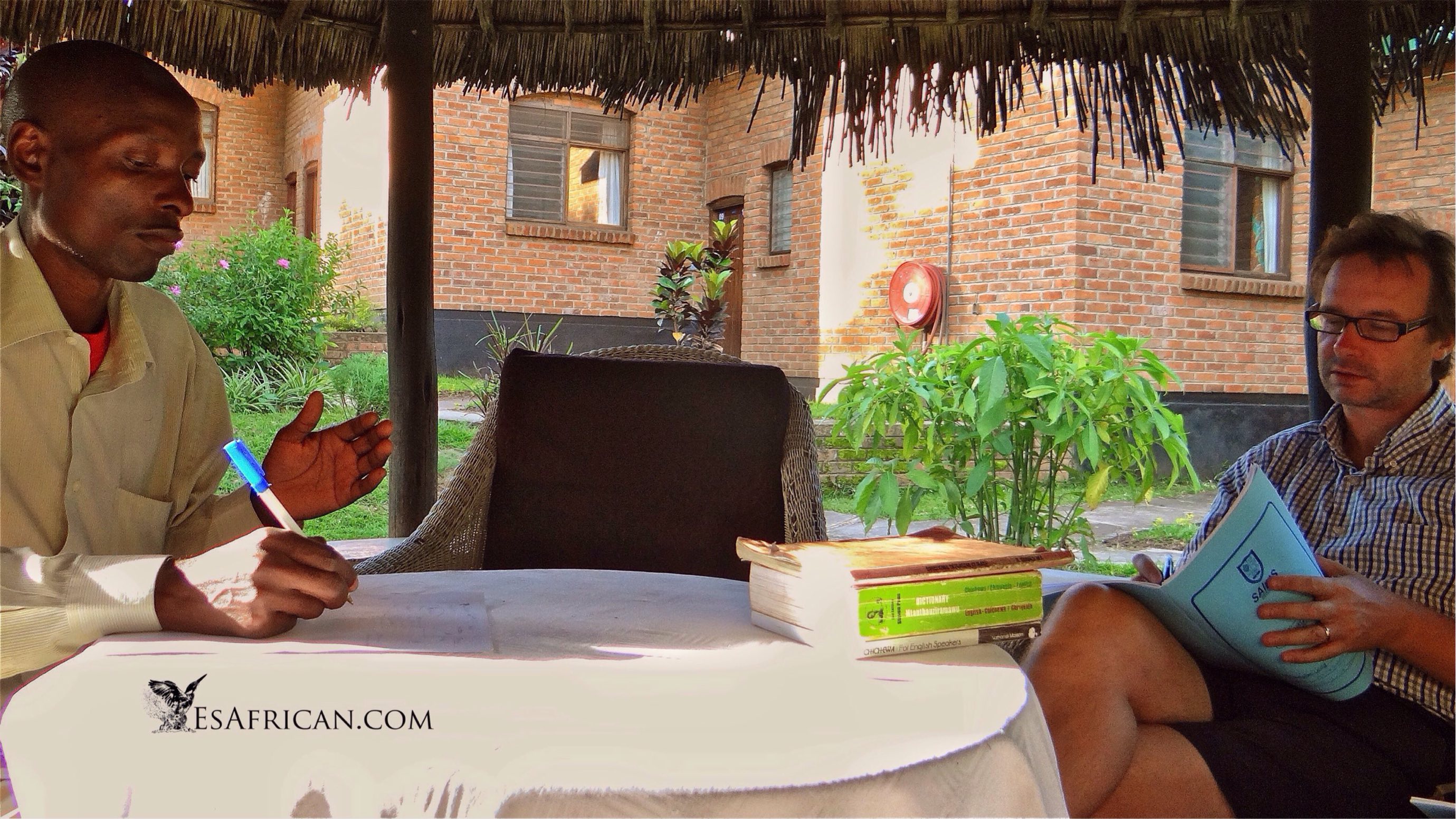What kind of language is Chichewa?
Well, an introductory paragraph for a very early book written by one of the missionaries springs to mind. He describes it as something like an elegant and subtle language. Another aspect I discussed recently with one of our language students was how it is like a set of codes that you put together in a logical manner. The root verbs, prefixes, infixes and suffixes are like different parts of a computer programme that each carry out different commands (have different meanings) and then once you know them you can them together to bring about various meanings. In other words with regards to verbs you put together the different components to make one word in the way you put together words in a sentence in English. In other words a word can carry the meaning of a whole sentence or a significant part of a sentence.
 The view from Fat Monkey's at Cape Maclear. The ideal environment for contemplating Chichewa
The view from Fat Monkey's at Cape Maclear. The ideal environment for contemplating Chichewa
The grammar surrounding nouns (noun classes), is difficult. As one expat who speaks the language pointed out – you don’t need to know the subtleties of the noun class grammar to be understood. My point here is that the most complex and hard to learn part of the language is not a barrier to communication and comprehension. I have heard visitors mangling the noun class grammar when speaking to a group. No one batted an eye lid or sniggered or even smiled and absolutely everyone understood what was meant. It was at the simplest level for a grammatical error (which is how it came to be that I could understand the error). If the grammatical error is analysed by a logician and pedant (I can’t think of anyone like that, can you?....), then the literal meaning becomes comical. As I said, no one was laughing, everyone understood and everyone (except me) had moved on to what was happening or being said next. I’m getting side-tracked here, perhaps I will come back later in the blog to what was said, what was meant, what was understood and what a pedantic logician who takes grammar very very seriously, would have made of it all.
I decided to write this blog post after discussing with the barman at Fat Monkeys (Cape Maclear) where I should work on my laptop. I decided to work ‘over there’, but knowing as I do that Chichewa is more sophisticated when it comes to ‘over there’ than English, I decided to practice my Chichewa on this particular point. The barman suggested I work ‘pafupi’, which is different to ‘uko’. ‘Pafupi means ‘over there in that place that is visible to us here’ rather than ‘uko’ which means ‘over there but at that place, that while it may be near, is out of sight from where we are now’. So, we discussed the difference between ‘pafupi’ and ‘uko’ and my knowledge of Chichewa improved very marginally. Of course, by taking an interest in the language I did what only a very tiny proportion of expats, these days, do.
Talking about the language in this way is one of those simple little conversations than can play the role of what we British do when we ‘talk about the weather’, to a stranger. It’s a tiny piece of uncontroversial communication that indicates friendliness between strangers and as it is about the language (rather than the weather), it is a small indication of interest in the other person’s language. So why don’t more expats do this?
 I hadn't seen my Chichewa teacher for months and I had not been thinking deeply about Chichewa for quite some time, but when I did - who should call me...Let me interrupt this blog post to say that as I completed the paragraph above I received a call from my Chichewa teacher… We have not spoken for months and I have not written or thought or talked about Chichewa in the way I am now, for months. How is that he has called me just at this point? We used to have detailed conversations about the grammar and about how the language is an indicator of culture and how people think… How is it that his mind prompts him to call me, from a driving distance of 289 kms * away, while I am thinking hard about Chichewa? Well, all I can say is that I am not sure that this is purely coincidence. Something else I find interesting is consciousness and quantum mechanics... so I do wonder whether this phone call was purely a coincidence or if there is something else going on that we hardly comprehend. Someone who has an inkling of the controversial relationship between quantum mechanics and consciousness may have some sort of idea about what I am talking about.
I hadn't seen my Chichewa teacher for months and I had not been thinking deeply about Chichewa for quite some time, but when I did - who should call me...Let me interrupt this blog post to say that as I completed the paragraph above I received a call from my Chichewa teacher… We have not spoken for months and I have not written or thought or talked about Chichewa in the way I am now, for months. How is that he has called me just at this point? We used to have detailed conversations about the grammar and about how the language is an indicator of culture and how people think… How is it that his mind prompts him to call me, from a driving distance of 289 kms * away, while I am thinking hard about Chichewa? Well, all I can say is that I am not sure that this is purely coincidence. Something else I find interesting is consciousness and quantum mechanics... so I do wonder whether this phone call was purely a coincidence or if there is something else going on that we hardly comprehend. Someone who has an inkling of the controversial relationship between quantum mechanics and consciousness may have some sort of idea about what I am talking about.
Well, I thought of writing more on Chichewa. But instead I think that this little glimpse of the language would be enough for now. People who spend too much time on the internet these days probably have shorter attention spans so I will stop now and get on with some other kinds of work!
* How is it that I know the exact driving distance? Am I some sort of nerd? Well….as it happens, the other thing I am doing here by the lakeshore is costings for the transfers between different points in Malawi so I have been taking note of the exact distances I have been driving.
